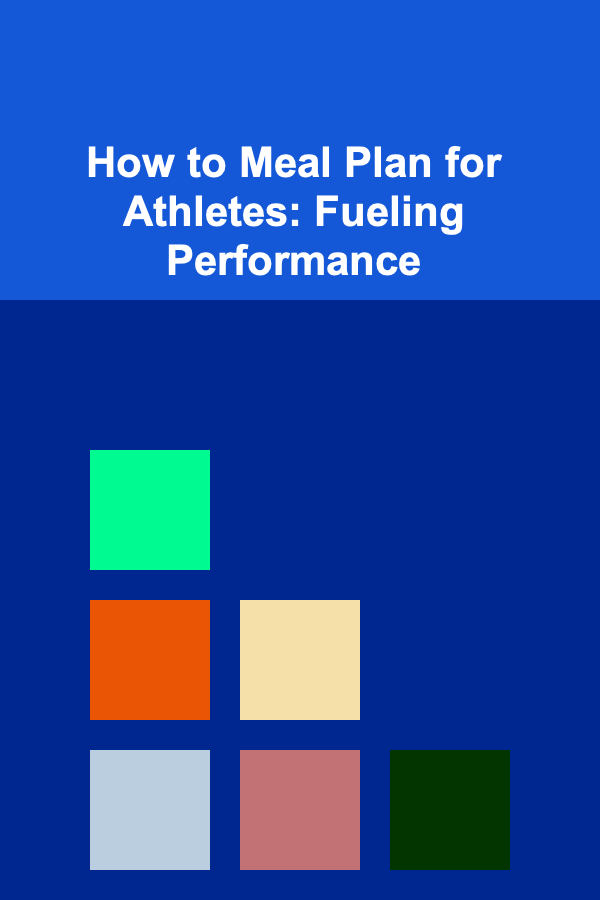
How to Meal Plan for Athletes: Fueling Performance
ebook include PDF & Audio bundle (Micro Guide)
$12.99$5.99
Limited Time Offer! Order within the next:

Athletic performance is not solely dependent on training and skill. A well-structured, nutrient-dense meal plan plays a crucial role in optimizing an athlete's performance, recovery, and overall health. Whether you are an elite athlete or a weekend warrior, understanding how to fuel your body with the right foods can enhance endurance, strength, and recovery while minimizing the risk of injury and fatigue. In this article, we will delve into the essential components of an effective meal plan for athletes, exploring nutrient timing, macronutrient breakdowns, hydration strategies, and the importance of specific vitamins and minerals.
The Basics of Fueling Athletic Performance
1. The Role of Macronutrients in Sports Nutrition
Macronutrients are the building blocks of a meal plan for athletes. They provide the energy needed for performance and recovery and are essential for muscle repair, growth, and overall bodily functions. The three primary macronutrients athletes need to focus on are carbohydrates, proteins, and fats.
Carbohydrates: The Primary Fuel Source
Carbohydrates are the body's most efficient and readily available energy source during exercise, especially for endurance sports. They are broken down into glucose, which is stored in muscles and the liver as glycogen. During high-intensity activities, glycogen is rapidly depleted, and if not replenished, it can lead to fatigue.
- When to Consume Carbohydrates: Athletes should consume carbohydrates throughout the day, with a larger portion before and after workouts to replenish glycogen stores and provide energy for training. Pre-exercise meals should be low in fat and fiber to avoid gastrointestinal discomfort but high in easily digestible carbohydrates.
- Types of Carbohydrates: Focus on consuming complex carbohydrates, such as whole grains, fruits, vegetables, and legumes, which provide sustained energy. Simpler carbohydrates, such as white bread and sugary snacks, should be limited as they can cause a spike and subsequent crash in blood sugar levels.
Proteins: Essential for Muscle Repair and Growth
Proteins are made up of amino acids, the building blocks of muscle tissue. Intense training causes muscle breakdown, and protein intake is crucial to repair this damage and promote muscle growth.
- How Much Protein Do You Need?: Protein needs vary depending on the intensity and type of training. For athletes, protein intake generally ranges from 1.2 to 2.0 grams per kilogram of body weight. Endurance athletes may require the lower end, while strength athletes or those focused on muscle building may need the upper range.
- When to Consume Protein: Protein should be consumed throughout the day, particularly after training sessions, to repair and rebuild muscles. The post-workout "anabolic window" is critical, and consuming protein within 30 to 60 minutes post-exercise may improve recovery.
Fats: The Long-Lasting Energy Source
Fats play a vital role in an athlete's diet, providing energy for prolonged low-intensity activities, supporting hormone production, and assisting in the absorption of fat-soluble vitamins.
- Types of Fats: Emphasize healthy fats from sources like avocados, nuts, seeds, olive oil, and fatty fish. Omega-3 fatty acids, found in fish and flaxseeds, play a crucial role in reducing inflammation, promoting joint health, and supporting heart health.
- Balancing Fat Intake: While fats are essential, they should not comprise the bulk of an athlete's energy intake. Fats should make up around 20-35% of total daily calories. Avoid trans fats and limit the intake of saturated fats.
2. Micronutrients and Their Role in Performance
Micronutrients, though required in smaller amounts, are equally important for overall health and performance. Deficiencies in certain vitamins and minerals can hinder energy production, muscle function, and recovery. Here are some key micronutrients to include in an athlete's meal plan:
- Iron: Essential for oxygen transport in the blood, iron plays a significant role in preventing fatigue, especially in endurance athletes. Good sources of iron include lean meats, spinach, legumes, and fortified cereals.
- Calcium and Vitamin D: Calcium is critical for bone health and muscle contraction. Vitamin D helps the body absorb calcium and supports immune function. Dairy products, leafy greens, and fortified plant milks are excellent sources of calcium, while Vitamin D can be sourced from sunlight, fatty fish, and fortified foods.
- Magnesium: Magnesium helps with muscle relaxation, nerve function, and energy production. Foods rich in magnesium include dark leafy greens, nuts, seeds, and whole grains.
- Electrolytes (Sodium, Potassium, and Chloride): These minerals help maintain fluid balance, nerve function, and muscle contraction. During prolonged exercise, electrolyte balance can be disrupted, leading to cramping and dehydration. Electrolyte-rich foods include bananas, sweet potatoes, spinach, and salt.
- B Vitamins: B vitamins are vital for energy production. They help the body convert food into usable energy, and deficiencies can lead to fatigue and decreased performance. Sources include whole grains, meat, eggs, and legumes.
Hydration: The Cornerstone of Performance
Hydration is crucial for athletes. Dehydration can impair performance, decrease endurance, and increase the risk of heat stress and injury. Proper hydration supports temperature regulation, joint lubrication, nutrient transport, and waste elimination.
3. How Much Water Should an Athlete Drink?
Water needs vary based on the athlete's body size, exercise intensity, and environmental conditions. A general recommendation is to drink at least 2 to 3 liters (8-12 cups) of water a day, but this can increase with exercise. During exercise, aim to drink 7-10 ounces of water every 10-20 minutes, especially in hot or humid conditions.
4. Electrolyte Drinks
For exercise lasting longer than 60 minutes, especially in hot conditions, water alone may not be enough to replace lost electrolytes. A well-formulated sports drink containing sodium, potassium, and carbohydrates can help replenish lost fluids and maintain performance. However, be cautious about sugary drinks, as they can spike blood sugar and lead to an energy crash.
Nutrient Timing: Maximizing Performance with the Right Foods at the Right Time
Nutrient timing is the strategic consumption of macronutrients around the training window to maximize performance and recovery. Here is a breakdown of nutrient timing for athletes:
5. Pre-Workout Nutrition
Pre-workout nutrition is essential to provide the energy needed for exercise. A meal rich in carbohydrates and moderate in protein should be consumed 2-3 hours before exercise. Carbohydrates will provide the energy needed for high-intensity or endurance activities, while protein ensures that muscle breakdown is minimized during the workout.
- Examples of Pre-Workout Meals: Whole grain toast with peanut butter, a banana, and a glass of water or a smoothie made with fruit, yogurt, and oats.
If you are short on time, a smaller snack like a granola bar, a piece of fruit, or a handful of pretzels can be consumed 30 minutes before exercise.
6. Post-Workout Nutrition
Post-workout meals are critical for recovery. After exercise, muscles need protein to repair and rebuild. Carbohydrates are also essential to replenish glycogen stores that were depleted during exercise.
- When to Eat After Exercise: Aim to consume a meal or snack within 30-60 minutes after training for optimal recovery. This is often referred to as the "anabolic window" when muscles are most receptive to nutrient uptake.
- What to Eat: A balanced post-workout meal should contain both protein and carbohydrates. A protein shake with a banana or a chicken salad with quinoa are great options for replenishing lost nutrients and promoting muscle recovery.
7. Balancing Macronutrients Throughout the Day
While nutrient timing around workouts is essential, it's equally important to balance macronutrients throughout the day to maintain energy levels and promote recovery. Each meal should include a source of carbohydrates, protein, and healthy fats.
Special Dietary Considerations for Athletes
8. Dietary Restrictions
Athletes with dietary restrictions---such as vegans, vegetarians, or those with food allergies---must take extra care to ensure they are meeting their nutritional needs. For example, vegetarians may need to find plant-based sources of protein, iron, and vitamin B12, while vegans may need to supplement with vitamin B12 or omega-3 fatty acids. Consulting a sports nutritionist can help athletes with dietary restrictions create a well-balanced, nutrient-dense meal plan.
9. Supplements: Are They Necessary?
While a well-balanced diet should provide all the essential nutrients, some athletes may turn to supplements to enhance performance or fill in dietary gaps. Common supplements include protein powders, creatine, omega-3 fatty acids, and multivitamins. However, supplements should be used in conjunction with a balanced diet, not as a replacement. Always consult with a healthcare provider before starting any new supplement regimen.
Conclusion: Personalized Meal Planning for Optimal Performance
An athlete's meal plan should be personalized to their specific needs, training goals, and performance objectives. By focusing on nutrient-dense, whole foods and timing meals around workouts, athletes can maximize their performance, enhance recovery, and maintain long-term health. Whether you're aiming for faster sprint times, better endurance, or more efficient muscle repair, nutrition plays a vital role in achieving your athletic goals.
Remember, nutrition is not a one-size-fits-all approach, so it's important to experiment with different foods, meal timing, and hydration strategies to find what works best for you. By prioritizing nutrition as part of your training regimen, you'll be setting yourself up for success on and off the field.
Reading More From Our Other Websites
- [Home Budget 101] How to Manage Home Expenses While Paying off Debt
- [Home Lighting 101] How to Incorporate Colored Lighting into Your Home Decor
- [Home Renovating 101] How to Add Smart Home Features During Your Renovation
- [Home Staging 101] How to Stage Your Home for the Holiday Season
- [Organization Tip 101] How to Set Up a Family Budget Station at Home
- [Home Party Planning 101] How to Plan a Cocktail Party at Home with Class and Elegance
- [Personal Financial Planning 101] How to Manage Your Finances When You're Just Starting Out
- [Sewing Tip 101] Troubleshooting Common Sewing Problems: When the Wrong Needle Is the Culprit
- [Personal Finance Management 101] How to Manage Your Finances During Times of Uncertainty
- [Organization Tip 101] How to Organize Your Garage for Better Functionality

How to Choose the Right Color Palette for Your Renovation
Read More
How to Create a Grocery Shopping Checklist for Busy Families
Read More
How to Optimize Storage Under Your Bed for Seasonal Items
Read More
How to Clean Your Air Conditioner Filter
Read More
Quality Control Inspector: How to Use Inspection Equipment Effectively
Read More
10 Tips for Communicating Complex Biochemical Concepts Clearly
Read MoreOther Products

How to Choose the Right Color Palette for Your Renovation
Read More
How to Create a Grocery Shopping Checklist for Busy Families
Read More
How to Optimize Storage Under Your Bed for Seasonal Items
Read More
How to Clean Your Air Conditioner Filter
Read More
Quality Control Inspector: How to Use Inspection Equipment Effectively
Read More